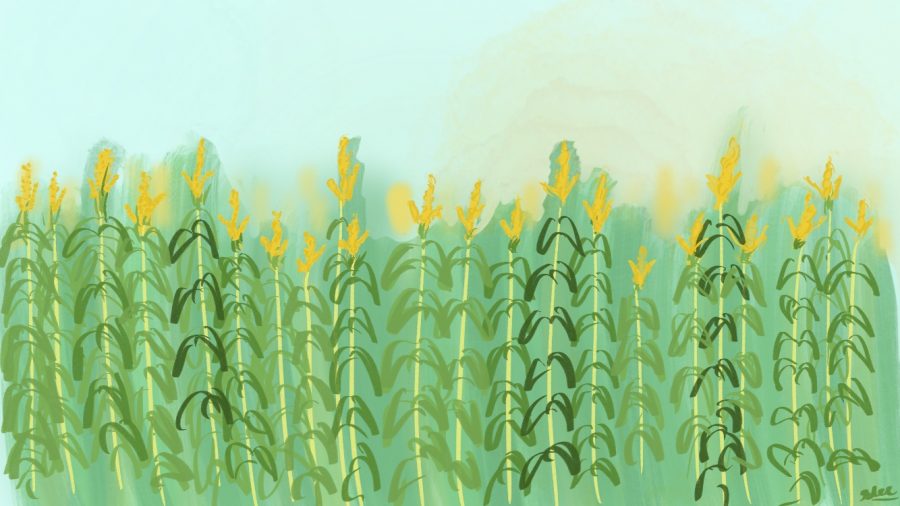The first thing that hits you when you enter a field of corn is the smell. The corn itself doesn’t have much of a smell but aphids — or more accurately their sh-t — reek. The stench of manure, both aphid and cow, permeates everything. It doesn’t matter how many times you wash your clothes, or yourself, the smell lingers. Nearly a year later, the sweatshirt I wore most days is still unwearable, and I keep it in an airtight bag so the smell doesn’t seep into anything.
I would say I spent the summer up to my eyeballs in corn, but if it were only up to my eyeballs the rains of pollen and seeds wouldn’t have covered every inch of my body, and filled every pocket, seam and crease in my clothing. If it had been up to my eyeballs, I would have seen the sun and not just felt it on my back. In a way, the sun was the worst part. It’s almost a cruel joke starting work at 5 a.m. in a field ankle-deep in mud, so wet with dew you’re soaked to the bone within five minutes, but to end the day nine hours later sun-baked and choking on dust.
Thankfully, though he was mean and did us all in with the pay, the farmer didn’t mind giving us a moment here and there so we could catch our breath, look at the geese destroying the already-picked field or watch the cars drive up the narrow road to somewhere I’ve never seen and will hopefully never go.
The first day was, without a doubt, the worst. I assumed there would be water so I only brought one bottle. But there wasn’t any — unless you were willing to drink from an irrigation hose, and I wasn’t — so by 11 a.m. my mouth was as dry as a bucket of sand. I wanted to quit. Every day that summer I wanted to quit. But quitting wasn’t an option. All I had heard between accepting the job and my first day was how I wouldn’t last the first day — maybe a week tops but definitely not the whole summer — so I had something to prove.
I’m not “home,” as my family calls Vancouver Island, very often, and when I am, the fact that I’m often away is a common topic of conversation. Now, however, the conversation was slowly shifting, becoming about my strong work ethic and putting in a hard day’s work. Though these comments were still laced with jokes, it still had transitioned from my impending departure.
On the plus side, fresh corn, and I really do mean fresh, is amazing. Picked right off the plant, it is crunchy and candy-sweet, and the juices run down your face. I haven’t been able to eat corn since then, not because it brings back bad memories but because once you’ve had the best of something, going back to average is hard to do. It has also deepened my appreciation for country music; when a really good country song comes on, about hard work, farms, heartbreak, I feel the right to think “that song is about me.”
I never thought I’d think of myself as a farmer or a hard worker but it wasn’t an accident that I found myself being both. There were other jobs I could have done — David’s Tea was hiring, and I’d be perfect for that. No, I wanted to prove that I wasn’t just the family nerd. I needed to prove that I could put my hand to the grindstone and be up early enough to see the sky turn blue.
Truthfully, the farmer did not expect me back after that terrible first day. Why would he? No one in their right mind would think I would be back. I showed up in short sleeves not knowing that that corn leaves are basically razors that will draw blood. It was also windy, and that brought with it dust. Dust and pollen. I had hay fever, hay fever so bad I could hardly breathe let alone do backbreaking work. I was also small and frail-looking, built like the academic I will become, not the farmer I was being. But when he suggested he just pay me for the days’ work and find someone new, I said no. I had won his respect and that of my family. But most importantly, I had won my own.
Email Andrew Ankersen at [email protected].
























































































































































